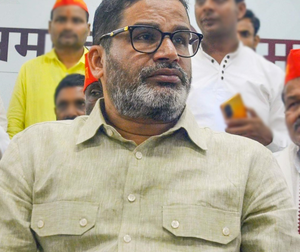Jan Suraaj Party leader Prashant Kishor is actively defending his party’s choice of candidate for the upcoming by-elections in Bihar, where he has fielded Jitendra Paswan from the Imamganj constituency.
Paswan, who has completed education up to the intermediate level, is locally referred to as ‘Doctor Sahab’, despite lacking formal medical qualifications.
The opposition has seized on this detail, questioning the legitimacy of his qualifications and the implications for public health in the region.
In response, Kishor addressed these concerns during a press conference in Gaya on Friday.
He clarified that the Jan Suraaj Party’s candidate selection process is conscientious and that Paswan’s title of ‘doctor’ is a reflection of local community recognition, not a formal credential conferred by the party.
“Bihar’s healthcare crisis, rooted in decades of underinvestment, has led rural communities to rely on Registered Medical Practitioners (RMP) like Paswan who, while not formally qualified, fill critical healthcare gaps in underserved areas,” Kishor said.
He stated, “If he (Jitendra Paswan) is providing the wrong medical facilities, then it is the responsibility of the government and the district health department to take action.”
Kishor’s defence highlights both the party’s pragmatic approach to candidate selection in challenging contexts and his critique of Bihar’s current healthcare infrastructure under successive administrations.
As the by-elections approach, this debate over Paswan’s qualifications may influence voter perceptions, particularly in rural areas facing ongoing healthcare access issues.
Prashant Kishor directed sharp criticism at Bihar’s healthcare system, calling for attention to its dependence on informal practitioners due to the longstanding inadequacies in rural medical services.
He defended Jan Suraj candidate, Jitendra Paswan, as one of over 100,000 such RMPs across Bihar who are essential to delivering healthcare in rural areas where formally qualified doctors rarely operate.
“It is precisely the lack of a robust healthcare system that has made these practitioners indispensable. The government should focus on strengthening the system rather than criticising those filling its gaps,” Kishor said.
Kishor’s critique extended to Bihar’s political establishment, particularly targeting the Rashtriya Janata Dal (RJD) and the Mahagathbandhan coalition. He pointed out that even in their ranks, a prominent figure — previously appointed as Law Minister — also practises as a “rural doctor” and even operates a hospital in his constituency Narkatiaganj in East Champaran district.
Questioning the healthcare commitment of Bihar’s leaders over the past 35 years, particularly under Lalu Prasad Yadav and Nitish Kumar, Kishor called for attention to the stark contrast between Bihar’s situation and that of more developed cities.
He pointed out that while Bihar’s urban centres have seen some improvement, with Gaya now staying open until 8:00 p.m. as compared to 6:00 p.m. earlier during the RJD regime, this progress is minimal compared to cities like Bengaluru or Hyderabad.
Kishor’s rhetorical question, “When will Gaya or Patna become like Bengaluru or Hyderabad?” underscores his argument that Bihar’s leaders have long focused on incremental changes instead of transformative development.






















